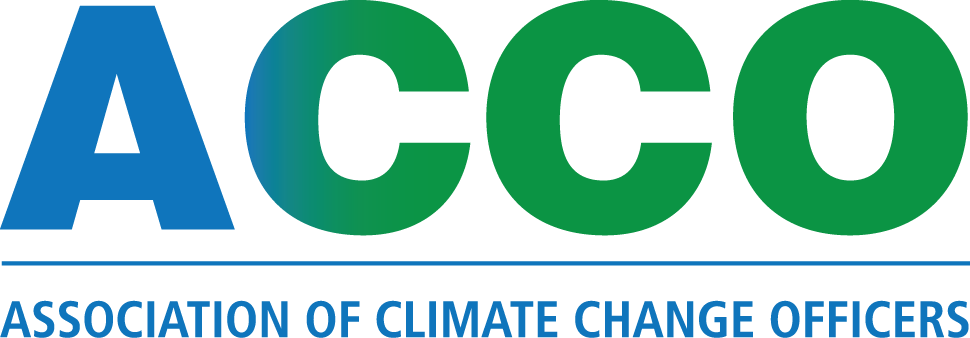(last updated Feb. 5, 2018)
Download a PDF of the ACCO Code of Ethics &
Professional Standards of Conduct
Code of Ethics & Professional Standards of Conduct
The Code of Ethics and Standards of Conduct are fundamental to the values of the Association of Climate Change Officers (ACCO) and essential to achieving ACCO’s mission of defining, developing and supporting the functions, resources and communities necessary for effective organizational leadership in addressing climate-related risks and opportunities.
High ethical standards are critical to enhancing and maintaining the public’s trust in the climate change profession. This document aims to serve as an aspirational model for climate change professionals globally, regardless of job function, cultural differences, or local laws and regulations.
All Certified Climate Change Professionals® must abide by the Code and Standards and are encouraged to notify their employer of this responsibility. Violations may result in disciplinary sanctions by ACCO, which may include revocation of membership and/or stripping of the Certified Climate Change Professional® credential.
The Code of Ethics
Climate change professionals must:
- Act with integrity, competence, diligence, respect, and in an ethical manner with their employer, fellow employees, partners, contractors and other colleagues in the climate change profession.
- Place the integrity of the responsibilities as a climate change professional above their own personal interests.
- Use reasonable care and exercise independent professional judgment when conducting analyses, making recommendations, taking actions, and engaging in other professional activities.
- Practice and encourage others to practice in a professional and ethical manner that will reflect credit on themselves and the profession.
- Maintain and improve their professional competence and strive to maintain and improve the competence of other climate professionals.
Standards of Professional Conduct
I. PROFESSIONALISM
- Knowledge of the Law. Climate change professionals must understand and comply with all applicable laws, rules, and regulations (including the ACCO Code of Ethics and Standards of Conduct) of any government, regulatory organization, licensing agency, or professional association governing their professional activities. Climate change professionals must not knowingly participate or assist in any violation of such laws, rules, or regulations.
- Independence and Objectivity. Climate change professionals must use reasonable care and judgment to achieve and maintain independence and objectivity in their professional activities. Climate change professionals must not offer, solicit, or accept any gift, benefit, compensation, or consideration that reasonably could be expected to compromise their own or another’s independence and objectivity.
- Misrepresentation. Climate change professionals must not knowingly make any misrepresentations relating to climate change related analyses, recommendations, actions, or other professional activities.
- Misconduct. Climate change professionals must not engage in any professional conduct involving dishonesty, fraud, or deceit or commit any act that reflects adversely on their professional reputation, integrity, or competence.
II. DUTIES FOR CLIMATE CHANGE PROFESSIONALS
- Loyalty, Prudence, and Care. Climate change professionals have a duty of loyalty to their employers and/or clients and must act with reasonable care and exercise prudent judgment. Fellows must act for the benefit of their employers/clients and place their employers’/clients’ interests before their own interests.
- Suitability.
- When climate change professionals are in an advisory relationship with a client, they must:
- Make a reasonable inquiry into a client’s or prospective client’s climate response experience, risk and return objectives, and constraints prior to making any recommendation or taking action and must re-assess and update this information regularly.
- Determine that an action is suitable to the client’s situation and consistent with the client’s written objectives, mandates, and constraints before making a recommendation or taking action.
- Judge the suitability of climate response strategies in the context of the client’s situation.
- When climate change professionals are responsible for managing an initiative related to a specific mandate, strategy, or style, they must make only recommendations or take only actions that are consistent with the stated objectives and constraints of the employer/client unless doing so is in conflict with other components of the ACCO Code of Ethics and Standards of Professional Conduct.
- Presentation. When communicating with employers, clients and/or other third-party organizations, climate change professionals must make reasonable efforts to ensure that messaging and/or deliverables are accurate, leverage up-to-date data and complete.
- Responsibilities of Supervisors. Climate change professionals must make reasonable efforts to detect and prevent violations of applicable laws, rules, regulations, and the Code and Standards by anyone subject to their supervision or authority.
- When climate change professionals are in an advisory relationship with a client, they must:
III. ANALYSES, RECOMMENDATIONS, AND ACTIONS
- Diligence and Reasonable Basis. Climate change professionals must:
- Exercise diligence, independence, and thoroughness in analyzing climate related risks and opportunities for their employers/clients, making recommendations related to response strategies, and taking actions.
- Have a reasonable and adequate basis, supported by appropriate research and investigation, for any recommendation or action.
- Communication with Employers and Clients. Climate change professionals must:
- Use reasonable judgment in identifying which factors are important to their analyses, recommendations, or actions and include those factors in communications with employers and/or clients.
- Distinguish between fact and opinion in the presentation of analysis and recommendations.
IV. RESPONSIBILITIES AS A CERTIFIED CLIMATE CHANGE PROFESSIONAL® AND ACCO MEMBER
- Conduct as Climate Change Professionals. Climate change professionals must not engage in any conduct that compromises the reputation or integrity of the Certified Climate Change Professional® credential, their employer and/or client, ACCO or peer practitioners.
